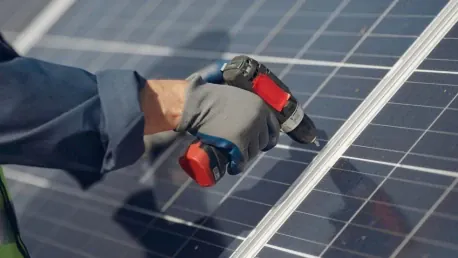Solrite Energy, in collaboration with sonnen, is pioneering a groundbreaking initiative to provide free solar and battery installations to Texas homeowners. This innovative business model, known as the “virtual power plant power purchase agreement” (VPA), aims to revolutionize the energy market by leveraging the potential of virtual power plants (VPPs). The initiative is designed to address the frequent power outage issues in Texas while capitalizing on the growing demand for consumer-owned energy resources.
The Vision Behind Solrite’s VPA Initiative
Embracing the Potential of Virtual Power Plants
Regan George, the CEO and founder of Solrite Energy, is a strong advocate for the potential of virtual power plants (VPPs) in Texas. He believes that the state’s energy market is primed for such innovation due to its unique challenges and opportunities. By offering free installations of solar panels and batteries, Solrite aims to demonstrate the financial viability of VPPs, which can generate significant revenue by contributing to the Texas power grid, managed by the Electric Reliability Council of Texas (ERCOT).
This approach is not only innovative but also practical. By retaining ownership and control over the installed systems, Solrite can monetize their performance on the Texas power grid, creating a continuous revenue stream. This strategy contrasts sharply with other companies in the sector, such as Sunrun, Sunnova, and Tesla, which often require financial participation from customers. Solrite’s initiative stands out because it exclusively shoulders the upfront costs, making it more accessible to a broader range of homeowners who may not have the financial means to invest in renewable energy systems.
Monetizing Excess Energy
The VPA initiative provides significant advantages to Texas households by offering rooftop solar panels and up to three sonnenCore+ batteries at no initial cost. This initiative not only tackles the economic barrier to entry but also addresses a critical need for reliable backup power during grid failures—an issue that has plagued Texas in recent years. With the frequent grid outages, these systems are designed to provide uninterrupted power, thereby enhancing the resilience of homes during crises.
Solrite aims to monetize the excess energy generated by these solar installations when the grid is operational. By selling this surplus power back to the grid, the company can balance the high installation costs through the revenue streams generated by these batteries. This approach effectively creates a win-win situation: homeowners benefit from free installations and reliable backup power, while Solrite capitalizes on the energy produced, thus making the VPA model sustainable and profitable.
Economic and Environmental Promises of VPPs
Decentralized Power Generation
The concept of virtual power plants offers substantial economic and environmental benefits that could transform the energy landscape. VPPs provide a decentralized alternative to traditional power plants and infrastructure, which could potentially save billions of dollars in construction and maintenance. This shift is particularly significant in an era where the demand for electricity is continually rising. By leveraging decentralized power generation, VPPs can meet this growing demand more efficiently than traditionally centralized power plants.
This decentralized approach does more than just reduce costs; it also increases the resilience of the power grid. In times of high demand or unforeseen outages, VPPs can quickly respond by supplying power generated from dispersed solar panels and batteries. This flexibility could play a crucial role in stabilizing the grid, reducing the need for new, costly fossil-fuel power plants. The environmental benefits are equally compelling, as this model supports a cleaner, more sustainable energy future by minimizing reliance on fossil fuels.
Integration of Renewable Energy Resources
According to the U.S. Department of Energy, the integration of electric vehicles, rooftop solar panels, batteries, and smart home devices could satisfy 10 to 20 percent of peak electricity needs by 2030. This significant contribution could save around $10 billion that utility customers would otherwise pay through higher electric bills. Such integration not only makes economic sense but also facilitates the transition to a more sustainable energy ecosystem. Customer-owned resources like solar panels and batteries can decrease greenhouse gas emissions by optimizing solar energy use and reducing the need for new fossil-fuel power generation.
This holistic approach to energy management also promotes greater energy independence and security. As more households become energy producers, the overall dependency on centralized power plants decreases. This distributed generation model can make the entire energy grid more resilient to disruptions, whether from natural disasters or other unforeseen events. Moreover, the environmental benefits are multi-fold, as this integration helps mitigate climate change impacts by reducing carbon emissions, making VPPs a compelling choice for the future.
Challenges and Risks in the VPP Market
Limited Revenue Opportunities
Despite the significant potential and promising outlook, current revenue opportunities for virtual power plants are still limited. Participants in the U.S. VPP market can earn several hundred dollars annually through discounts or payments. This compensation is essentially a share of the revenues that VPP operators pass back to customers, but it’s often insufficient to cover the high costs of residential battery installations, which typically exceed $10,000. This economic imbalance poses a significant challenge to the widespread VPP adoption in the residential sector.
The considerable upfront investment in battery storage systems means that financial returns have to be carefully calculated over a longer period. While the annual earnings might seem modest, the cumulative benefits over the years can be substantial. However, this requires VPP providers to create innovative financial models and pricing structures that make these investments more appealing to homeowners. Without addressing these economic challenges, the growth and scalability of VPPs could remain constrained, limiting their impact.
Solrite’s Strategic Approach
Solrite Energy, a self-funded startup, faces the daunting task of leveraging VPP market opportunities to make its investment worthwhile. Regan George acknowledges the inherent risks associated with prioritizing VPP revenue over immediate returns. To navigate these challenges, Solrite adopts a disciplined approach by gradually increasing deployments and collaborating with financing and tax-equity partners. This methodical strategy mitigates risks and avoids aggressive expansion without guaranteed returns, ensuring a more sustainable business model.
By taking a calculated and measured approach, Solrite aims to build a robust foundation before scaling operations extensively. This strategic restraint allows the company to adapt and refine its business model based on performance and market feedback. Furthermore, collaborations with financial partners help spread the economic risk, making the venture more viable in the long term. While the path is fraught with challenges, Solrite’s disciplined approach and focus on sustainable growth could set a precedent for other startups in the VPP market.
Regional Variations in VPP Market Viability
Puerto Rico’s Need for Backup Power
Different regions present varying economic contexts for implementing virtual power plants. In Puerto Rico, VPPs are particularly valuable due to the frequent need for backup power during storms and grid outages. The island’s unique circumstances necessitate reliable and resilient power solutions, making VPPs an ideal choice. Programs from Puerto Rico’s private grid operator, Luma Energy, support these initiatives, although they heavily depend on subsidies from the U.S. Department of Energy to remain viable. These subsidies play a crucial role in offsetting the high costs associated with deploying and maintaining VPP systems on the island.
The widespread adoption of VPPs in Puerto Rico also highlights the potential of decentralized energy generation in regions with vulnerable power infrastructure. By relying on a network of distributed energy resources, Puerto Rico can enhance its energy resilience and reduce the impact of grid failures. However, the heavy reliance on subsidies underscores the need for sustainable financial models to ensure the long-term viability of VPPs in such regions. Without continued support, the economic feasibility of these projects could be at risk, limiting their scalability and impact.
California’s Mature Market
In contrast to Puerto Rico, California boasts a more mature market for residential solar and battery systems. This maturity stems from the state’s robust incentives and reformed net-metering policies, which have fostered a conducive environment for renewable energy adoption. As a result, VPP providers in California often shift existing solar-battery customers into new programs and market opportunities that arise intermittently. This mature market context offers a stable foundation for expanding VPP initiatives, but it also presents unique challenges in staying ahead of evolving regulatory landscapes and market dynamics.
The advanced stage of California’s market means that many homeowners are already familiar with the benefits of solar and battery storage systems. This familiarity can streamline the process of enrolling customers into VPP programs, as the value proposition is already well understood. However, to sustain growth and innovation, VPP providers must continuously adapt to new regulatory changes and emerging energy trends. This requires a proactive approach to policy engagement and market analysis, ensuring that VPP offerings remain attractive and competitive.
Texas’ Promising Economic Opportunities
Compared to Puerto Rico and California, Texas holds a unique position with its substantial potential for reliable revenue generation from virtual power plants. Blake Richetta, the CEO of sonnen’s U.S. operations, asserts that the economic opportunities in Texas are significantly more promising than those available in other regions. This potential largely stems from the state’s distinct energy landscape and the demand for reliable backup power solutions. Texas’ energy market offers fertile ground for innovative VPP models like Solrite’s VPA initiative.
The promise of the Texan market lies in the combination of high energy consumption, frequent grid outages, and an increasing interest in renewable energy solutions. This convergence creates a ripe opportunity for VPP providers to demonstrate the value and reliability of decentralized power generation. By harnessing solar energy and battery storage, VPPs can offer a resilient and sustainable alternative to the traditional power grid. In doing so, they can capitalize on the substantial economic potential, positioning Texas as a leader in the next generation of energy solutions.
Solrite and sonnen’s Collaborative Effort
Advancing the Solar-Battery VPP Market
Blake Richetta of sonnen strongly supports Solrite’s innovative model, highlighting how the aggressive and fast-paced approach aligns perfectly with sonnen’s vision of advancing the solar-battery VPP market. This collaboration aims to significantly expand the implementation of virtual power plants and make renewable energy more accessible to homeowners across Texas. By offering free solar and battery installations, the partnership between Solrite and sonnen is set to drive a transformative change in how energy is generated and consumed in the state.
The synergy between Solrite’s bold business model and sonnen’s technological expertise creates a compelling proposition for both homeowners and the broader energy market. This collaborative effort not only underscores the potential of VPPs but also sets a precedent for future partnerships in the renewable energy sector. By pooling resources and expertise, Solrite and sonnen aim to accelerate the adoption of decentralized power solutions, demonstrating the viability and benefits of VPPs on a larger scale.
Addressing Power Outage Concerns
Solrite Energy, in partnership with sonnen, is launching a transformative initiative to offer free solar panels and battery installations for Texas homeowners. This cutting-edge business model, referred to as the “virtual power plant power purchase agreement” (VPA), is set to disrupt the energy industry by harnessing the potential of virtual power plants (VPPs). This strategy not only aims to tackle the recurring power outage problems in Texas but also taps into the increasing trend of consumer-owned energy solutions. By utilizing VPPs, Solrite Energy and sonnen plan to create a decentralized energy network that empowers homeowners to generate, store, and share their energy. This decentralized approach enhances grid stability and ensures a more reliable power supply. Moreover, the initiative underscores the shift towards renewable energy sources, promoting sustainability and reducing reliance on fossil fuels. Through this innovative approach, Solrite Energy and sonnen are paving the way for a resilient and sustainable energy future for Texas.









